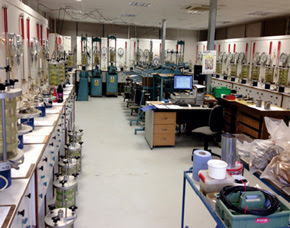
Soil stabilizing polymers reduces road construction cost and saves time
 SoilTech stabilizing polymers are elastomers which do not become brittle when cured. The elastomer is able to flex under load and unlike cement stabilization, will not crack under excessive loading.
SoilTech stabilizing polymers are elastomers which do not become brittle when cured. The elastomer is able to flex under load and unlike cement stabilization, will not crack under excessive loading.
SoilTech MK III stabilizing polymer has been purposely designed to penetrate through the road’s base layer, into the sub-base layer, via capillary action. This sub-base strengthening process is of significant importance as it is not only stabilizing the road’s base layer, but also creating a semi-bound sub-base. From a road design perspective, a strengthened sub-base may negate the need for further layer-works. SoilTech, in many instances, transforms in-situ materials that would normally be classified as unusable or waste materials, into suitably modified aggregates, for use in base and sub-base layer construction.
Advantages:
- Reduce the consumption of quarry aggregate in conventional construction
- In many instances in-situ materials can be used
- Speed up construction time
- Reduce construction costs
- Dramatically reduce CO2 emissions
- Reduced maintenance – as long as the asphalt wearing course layer is maintained, the structural integrity of the road will be preserved, with the road pavement remaining rut free and eliminating the need for base or sub-base maintenance
These polymer advantages address the pivotal factors influencing road construction costs. SoilTech stabilized roads should be at least 30% more cost-effective than conventional road designs. Smart Road Materials are advancements in nano-polymer technology that drive innovation in new construction methodologies.
The Resilient Modulus (MR) is a measure of subgrade material stiffness. A material’s resilient modulus is actually an estimate of its modulus of elasticity (E). While the modulus of elasticity is stress divided by strain for a slowly applied load, resilient modulus is stress divided by strain for rapidly applied loads – like those experienced by typical roads. This critical relationship of structural strength and high yield strain (elastic modulus), differentiates SoilTech Mk. III polymer technology from conventional cement stabilization.
Structural strengths achieved with SoilTech polymer stabilization, exceed international single axle loading (80kN) standards by several hundred percent. A further major design benefit of SoilTech polymer, is the fact that the elastomeric properties of SoilTech also provides unsurpassed tensile performance, for road stabilization. Engineers are now able to reduce the number of supporting layers, traditionally used to support conventional rigid or flexible pavement designs.
